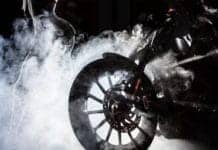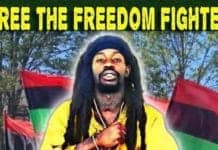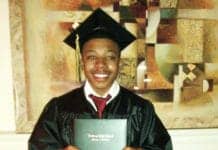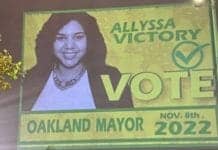
by Eric Hunter, Black New World Media
“The Council,” brought to us by Ryda for Life Films, tells a story of civil social unrest in the Black community today. Its setting is in South Central Los Angeles and starts off like your typical gangsta movie, but beneath the surface there’s a radical politicized element to it. I got the vibe that it was going to be an action movie, and it was also pretty informative on the current conditions and climate of the Black community.
This movie shows the similarities of street gangs and paramilitary cadres in the eyes of the government. They both fall under the category of organized crime. This particular group of soldiers off the streets, who happen to be considered a “criminal organization” by the law enforcement in this movie, is known as The Council.
In a setting like South Central Los Angeles, the canvass already has a background illustrating one of the most infamous police departments known for its corruption. From the Ramparts scandal to the Iran Contra scandal that was brought to the surface in the trial of the drug kingpin Freeway Rickey Ross, it’s obvious that the police, the politicians and major corporations are all connected to the criminal underworld.
Crime is the first level of rebellion. People break the law when they feel that the law is against the people’s interests. The conditions of the impoverished urban areas create the fiercest Black militant freedom fighters, who usually get caught up waging war on all these fronts.
The two main characters of this movie are leaders of The Council. They have complementary but opposite personalities. The mastermind of this organization goes by the name Messiah. He is a schoolteacher and a community activist. The other character goes by the name Khalid, who is an uncompromising corrective killer, the muscle of the militia.
He has the spirit of the great Dr. Khalid Abdul Muhammad. He is a relentless, rebellious warrior who did not leave much room for negotiations. This kind of behavior can be really reckless in times when you must keep your composure calm and collective to reach a common objective. However, without this element in the equation, people will try to take advantage of your patience. Messiah and Khalid balance each other out, but the scale is in constant motion and never reaches a total equality.
If you think the gangland underworld, Wall Street corporate circles and government is wild, the life of a revolutionary must be 10 times as wild, because to completely change reality you must destroy all these elements of exploitation while simultaneously creating a new reality.
This movie has scenes of assassinations of LAPD detectives, drug kingpins and other capitalist parasitic predators of the urban underworld. What they first carry out is in retaliation for the Black man murdered by the police at the beginning of the movie.
One of the assassinations seems to be a reenactment of the scene in Spike Lee’s “Malcolm X” movie when Malcolm X got assassinated. The Council carry out strategized and structured hits that are so brilliant. In one hit they create not only a diversion, but a scenario where Messiah, the mastermind, appears to be coming to the assistance of the person they assassinated.
The Council play a position of trying to develop community control to defend the people and enforce justice on the streets. The plot of this movie is multi-pronged. It seems as if there are so many different stories that it was hard to bring them all together. They have feuds with drug lords in attempts to keep the drugs off the streets. They have minor non-antagonistic contradictions with the Christian reformist activists.
They are at war with the LAPD and FBI political officials who happen to be under the thumb of the Mafia, whom The Council seem to have diplomatic ties with. It looks wild. But that must be how chaotic it really is in that realm. If you think the gangland underworld, Wall Street corporate circles and government is wild, the life of a revolutionary must be 10 times as wild, because to completely change reality you must destroy all these elements of exploitation while simultaneously creating a new reality.
The name and character of Messiah in a motion picture with Black militant content speaks volumes. In the documents of the FBI Counterintelligence Program, known as COINTELPRO, they say that one of their long-term goals is to “prevent the rise of a Black Messiah who can unify and electrify the militant Black Nationalist movement.”
In one scene, The Council left behind a playing card depicting their logo on one side, and the FBI director who created the Counterintelligence Program, J. Edgar Hoover with a hole in his head, on the other. In Black liberation theology, Biblical and Quranic allegory and metaphors are used to propagate to Black and oppressed people that it is God, the ancestors, and the will of universal law and order to rebel against injustice and tyranny.
In Biblical terms, the Messiah plays the role as the messenger of the last days, prophesying the second coming of a savior to right the wrongs of the world. The “Black Messiah” is a threat to the white power structure.
The acting and the way the script was structured lost me. It was kind of confusing. I’m not sure if there was supposed to be a sequel or a prequel, but it seems incomplete. The content of this movie makes up for all of that. It’s more entertaining than educational.
It lacks depth in breaking down the historical. It seems to be more focused on the modern phenomenon of the criminal underworld than the underlying politics of it all. The movie leaves room for you to research and learn the politics for yourself.
The apolitical cloaking often makes the messages so hidden that the viewers end up missing the message and get lost in the action, without understanding the meaning of the action. There are all kinds of subliminal messages and symbolism to decode in this movie, but the display of resistance against an oppressive system is deeper than all of its hidden messages.
Eric Hunter can be reached at ehunter6300@gmail.com.

 Store
Store












